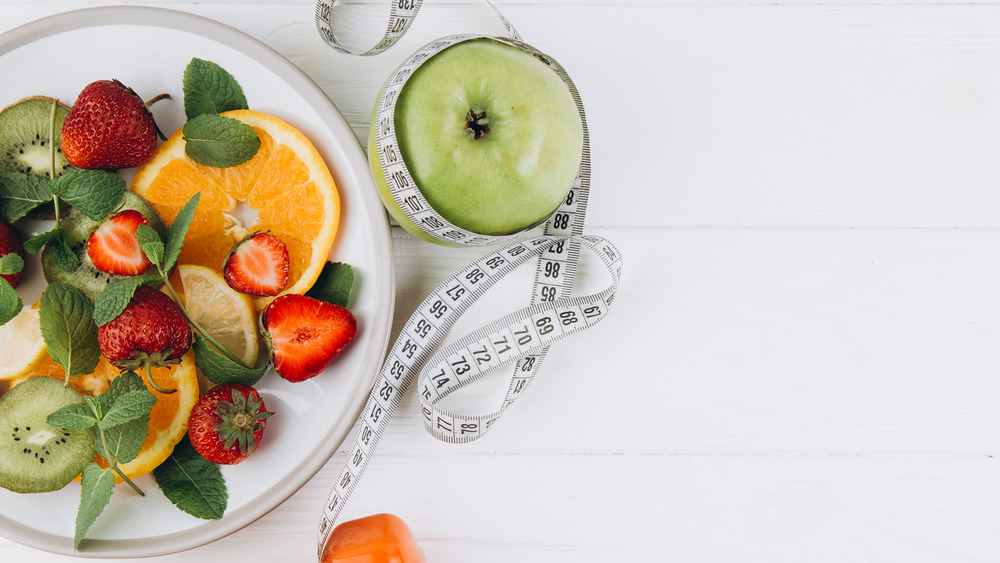Why Your Body Won't Be The Same After You Start The Whole30 Diet
Even if you haven't tried the Whole30 diet, you've likely tried at least one form of diet over the years. In fact, an estimated 45 million Americans diet each year. Some hope for weight loss, while others want to stave off heart disease, increase their energy levels, or improve the condition of their skin. Increasingly, people are hoping to discover any food sensitivities wreaking havoc in their bodies.
Whole30 is be a popular choice among such people because it calls for eliminating certain foods (like gluten, dairy, and corn). "An elimination diet is considered a therapeutic diet," Sunny Brigham, clinical and integrative nutritionist, explained to Health Digest. "A similar short-term diet is used therapeutically by nutritionists and dietitians. It's meant to heal and teach people what foods cause them problems."
However, without professional guidance, efforts can backfire. "When eliminating some foods from your body, you'll be eliminating nutrients as well," said Brigham. "I never recommend someone take on a therapeutic diet on their own because it's not just about eating a specific way. You also need to know which supplements you might need as well as lifestyle alterations." And, it's important to know that, for better and worse, your body will change when embarking on the Whole30 diet.
The Whole30 diet is not your average diet
The basic premise of the Whole30 program is simple: Remove common allergens and pro-inflammatory foods from your diet for 30 days, then reintroduce them slowly and deliberately. According to Everyday Health, it's a "nutritional reset", helping to raise your awareness of how your body reacts to food groups and ingredients.
It works like this: For 30 days, eat only whole, natural foods typically found in the perimeter of the grocery store (like produce and protein sources). Do not consume any foods or beverages that can be problematic (processed foods, sugar, any sweetened foods, alcohol, grains, dairy, and legumes), and avoid additional common additives (carrageenan, MSG, and sulfites).
There are two other program faux pas. Don't attempt to recreate your favorite sweet treats or baked goods with compliant foods — that means no sweet potato pancakes or cauliflower pizza crust. You're encouraged to work through cravings you might have for trigger foods, so substitutions defy the spirit of the program. And don't step on the scale or take any measurements. Focusing on weight loss and body composition will distract you from other potentially dramatic and beneficial physical changes you are making.
The Whole30 diet may improve or worsen your stomach issues
The Whole30 diet can change your body in many ways, some positive and some not-so-positive. "It decreases inflammation in the body, which is the main cause of most chronic disease," Shae Leonard, a licensed physician assistant and functional medicine clinician told Health Digest. And by eliminating foods that are inflammatory to the immune system, which lies in your GI tract, you can heal the intestinal lining, reducing leaky gut – often the cause of symptoms such as gas and cramps.
But sometimes, the opposite can happen. Those symptoms can actually increase. Maria Sorbara Mora, registered dietitian, told Health Digest, "There is data suggesting the diet actually causes GI distress. Side effects include stomach aches, bloating, and diarrhea. This is mostly due to the recommended increase in fiber, which can be quite distressing for a body."
"By limiting so many foods and overloading your system with mainly fruits and vegetables, lean proteins, and only some fats," Mora explained, "your gut lining may become irritated and lead to inflammation known as gastritis."
Can the Whole30 diet improve your immune system?
It is possible to strengthen your immune system while following the Whole30 diet, Sunny Brigham, clinical and integrative nutritionist, explained to Health Digest. "This is because most of the immune system lies within the small intestine," she revealed. "Overtime, our immune system starts to recognize some foods as invaders. This creates food sensitivities." And, a lifetime of poor eating habits allows some people's immune systems "to go a little haywire," per the nutritionist.
By removing foods that are inflammatory to the immune system, it can calm down and resume normal functioning. However, most people "don't know how to add back in foods properly. So once they start eating normally again, those symptoms start to return," Brigham told Health Digest. "Or, many people stay on it too long and develop disordered eating habits."
If you are struggling with an eating disorder, or know someone who is, help is available. Visit the National Eating Disorders Association (NEDA) website or contact NEDA's Live Helpline at 1-800-931-2237. You can also receive 24/7 Crisis Support via text (text NEDA to 741741).
When you first start the Whole30 diet, you'll likely get headaches
When you first start out on the Whole30 diet, one of the hardest challenges to overcome physically might be the accompanying headache. There's a reasonable explanation for this pain, however: Your body is simply fighting an addiction to sugar.
According to Medical News Today, consuming less sugar that usual can trigger a sugar withdrawal headache. This was the case for Carrie Forrest, a clean eating specialist with a master's degree in public health nutrition. "Headaches were a result of cutting out all sugars and not eating enough for the first couple of days," Forrest said of her own experience with Whole30 when speaking with Health Digest. "By Day 3, I was better prepared in terms of having more compliant foods on hand, and my body was starting to adjust to not eating sugar."
You don't necessarily have to suffer if you choose to try the Whole30 diet. Choosing complex carbohydrates (fruits and vegetables), staying hydrated, getting enough sleep, exercising (especially outdoors) can all help. And even just the knowledge that this is a short-lived problem can help you power through. Your body will get used to a new normal and the head pain will cease after a few days.
You might experience mood swings on the Whole30 diet
There are known links between your food and your mood. What are generally considered "good-quality diets" — those incorporating healthy fats, fruits, vegetables and high-fiber foods, while limiting fast food — have been known to lower stress and improve depression symptoms.
Managing mood swings is often a precursor to people wanting to change their diets. "Those who succeeded with Whole30 came to see me as they were questioning aspects of their mental wellness, such as brain fog or even worsening anxiety," Dr. Uma Naidoo, director of Nutritional and Lifestyle Psychiatry at Massachusetts General Hospital, told Health Digest. "Based on personalized nutrition, we would then tweak what they were eating to help their emotional health."
But what happens to your mood after you start the Whole30 diet? Dr. Gary L. Wenk, a professor in the departments of psychology and neuroscience at The Ohio State University and author of Your Brain on Food, told Shape, "Changes in brain chemistry that can affect your mood occur when you restrict calories." That caloric reduction can result in that hungry/angry combination (hangry). And then add withdrawal symptoms as you wean yourself off sugar? You're bound to be irritable for a bit.
Fatigue may be a part of your Whole30 experience
Lots of people get tired, even those people who have a solid dietary practice. They might go too long without eating when they're busy, or their breakfast choices might need some tweaking. And while starting the Whole30 diet might sound like a good solution for fatigue, it often brings it on.
"The Whole30 diet is a simple concept of real food going into your body," Dr. Livingood, a chiropractic physician and doctor of natural medicine, told Health Digest. "You may experience fatigue as your body is ridding itself of all the toxic chemicals all at the same time."
According to Well+Good, "One major reason why many people feel tired when doing an elimination diet is because they've been relying on sugar and carbs for quick energy and once they cut them out, they realize how their body runs without these foods — and it isn't pretty."
In time, you'll have more energy on the Whole30 diet
If you are looking for a boost and try the Whole30 diet for the promise of an energy influx, you'll get it about halfway through. Delish dubbed it a "magical boost" when you experience the burst of energy. The program creators call it "Tiger Blood," and it's the phase when the fatigue, headache, and crankiness of the first few days are replaced with the newfound energy attributed to consuming healthier alternatives.
"When you initially start ingesting real food, you will notice an energy change in the body," Dr. Livingood, a chiropractic physician and doctor of natural medicine, told Health Digest. "It is a natural result as you are taking toxic chemicals out of your body and your digestive system is introduced to real foods."
For many, this phase makes it all worth it — and becomes an eye opener for connecting diet with physical sensations. And, thankfully, there is no downside to this part of the diet.
You may feel less bloated on the Whole30 diet
According to Sara Korzeniewski, registered dietitian and functional diagnostic nutrition practitioner, bloating is that "uncomfortable fullness" we all experience from time to time. But some people experience it all the time — and that's a sign that your GI system might not be working properly. Whether you have a food intolerance, unhealthy bowel movements, a leaky gut, or a problem with bacteria levels of bacteria in your digestive tract, the Whole30 diet could help.
"Many people believe that dairy and gluten cause bloating," Maria Sorbara Mora, registered dietitian, told Health Digest. "Proponents of the Whole30 program tout that when these foods are out of your system you have less stomach bloating." Carbohydrates need more water to be broken down so when carbs are cut from a diet through total elimination, body water is released, thus providing relief from bloating.
"The problem comes when too much water is released from your body, causing it to dehydrate," Mora cautioned. "This can slow digestion leading to GI discomfort and gas production in the gut (hence bloating in a different way)."
Your digestive system may become more efficient on the Whole30 diet
Your digestive system functions by turning the food you consume into nutrients and the energy you need to survive. And your food sensitivities or other digestive issues, like constipation, can affect that important job your body is trying to do. Furthermore, sometimes a lack of digestive enzymes causes digestive distress.
"Digestive changes typically occur because we don't usually have the normal amount of enzymes to properly digest real food," Dr. Livingood, a chiropractic physician and doctor of natural medicine, told Health Digest. "As you keep going with the [Whole30] process, your body will start to get acquainted with it. As a result, bowel movements will improve."
This doesn't mean that once improved, forever improved, though. If you were to go back to eating say, lots of sugar and mostly processed foods, you'd likely notice changes in your digestive system. "Digestion is a constant evolution," Dr. Kyle Staller, director of the gastrointestinal motility laboratory at Harvard-affiliated Massachusetts General Hospital told Harvard Men's Health Watch. By working to sleuth out what might be wrong with your system, though, you'll gain efficiencies and feel better than you knew you could.
You may have improved insulin sensitivity on the Whole30 diet
Insulin is a hormone made in your pancreas that takes the glucose your digestive system creates from carbohydrates and turns it into usable energy (via Healthline). Some people require larger amounts of insulin than others to keep their blood glucose levels stable. Those with a higher insulin sensitivity use blood glucose more effectively, while those with a lower insulin sensitivity are insulin resistant.
In general, high-fat, low-carbohydrate diets are popular for treating insulin resistance. "On the Whole30 diet, you likely have improved insulin sensitivity due to fewer blood sugar spikes and reduced inflammation," Stephanie Greunke, registered dietitian and certified personal trainer, explained to Health Digest. But over time, the results might make you more insulin resistant. And insulin resistance will increase your risk of developing prediabetes or type 2 diabetes.
If you're concerned about your glucose levels, a low-fat, plant-based, whole-food diet that is high in natural carbohydrates may be the way to go (via Mastering Diabetes). Regardless, the most important thing to do before starting any diet is to consult your doctor.
You'll likely feel less hungry, eat less, and lose weight on the Whole30 diet
The Whole30 diet not touted as a weight-loss plans by its creators. There's no calorie counting, meal skipping, or total carb elimination. Instead, it's considered a "reset" on your food intake. Nevertheless, many people do lose weight following the program.
"Excluding foods from your diet, such as grains, foods with added/refined sugars and cheese — all of which can be higher glycemic foods and more calorie dense — but instead eating high-fiber, Whole30-approved vegetables may also lead to weight loss," Dr. Uma Naidoo, director of Nutritional and Lifestyle Psychiatry at Massachusetts General Hospital, told Health Digest.
Once you cut back on sugar and fill up on nutrient-rich protein, healthy fats, fruits, and vegetables, you will feel fuller a lot faster, which will naturally lead to eating less and, in turn, losing weight. However, as you continue on the plan, you likely won't sustain the same pace of weight loss. "With your body getting used to the changes and accepting them as the new normal, weight loss will most likely slow down," a chiropractic physician and doctor of natural medicine Dr. Livingood told Health Digest.
You may find some relief from eczema on the Whole30 diet
If you're one of the 15 million Americans with eczema, you'll likely do anything to find relief. Though not harmful, the itchy bumps of an eczema patch are uncomfortable at best, painful at worst.
While relief might seem impossible, the Whole30 program could offer the solution you're looking for. While food sensitivities might not trigger an eczema outbreak, they might make the one you're experiencing much worse. Additionally, Stephanie Greunke, registered dietitian and certified personal trainer, explained to Health Digest, "With the Whole30, you'll likely have reduced levels of systemic inflammation which impacts your overall skin condition."
Although there are some anecdotal reports of Whole30 helping eczema, scientific evidence is still lacking, as of this writing. As such, Abbey Sharp, registered dietitian and founder of Abbey's Kitchen Inc., recommends adding foods as opposed to removing foods to help you find relief. Foods with Omega-3 fatty acids and probiotics have shown promise.
Your face may look clearer on the Whole30 diet
Like most adults, you probably started caring for your skin back in high school, around the same time your mother advised you to cut back on the junk food and soda pop. But some people are affected by acne well into adulthood — and some of the same contributors may be at play.
"The strongest evidence to date on dietary triggers for acne is for high-glycemic-load diets," revealed a study co-presented by the Baylor College of Medicine and Georgetown University School of Medicine study. For context, pure sugar has the highest glycemic index and causes your blood sugar to rise the fastest. Processed foods are pretty high up there, as are many carbohydrates.
It makes sense that if acne is aggravated by high-glycemic-load diets, a diet focused on lower glycemic load foods, like the Whole30 program, would be helpful for your skin. That's just what Ariel Klein shared with Real Simple: "By the end of the 30 days, my skin looked and felt incredible." Indeed, Dr. David Lortscher, board-certified dermatologist, told Healthline that "some parts of the Whole30 diet," including the reduction of sugar and carbs, "may benefit your skin."
Could your brain function better on the Whole30 diet?
Many people experience brain fog — or the inability to think — from time to time. And there are many things that might cause the problem, ranging from serious medical conditions like multiple sclerosis or lupus to medications or a lack of sleep. But experts in brain science believe the way you fuel your body might also be to blame, at least for some people.
According to the folks at Apex Brain Centers, "[The Whole30 diet] is primarily a ketogenic type of diet. Switching fuel from glucose to ketones has been shown to be successful with managing symptoms of Parkinson's disease, as well as migraines and traumatic brain injuries. Ketones have already been associated with decreasing free radicals, which are byproducts of food metabolism; therefore decreasing systemic inflammation in the body and brain."
At the very least, your brain will be empowered with new knowledge after trying the Whole30 diet: knowledge of your body's food sensitivities, dependency on sugar, and ability to digest the foods you provide it with.















